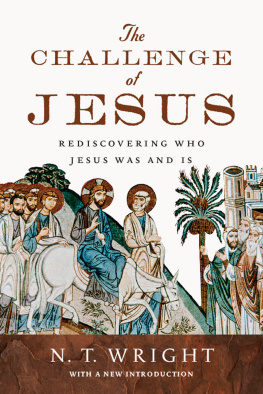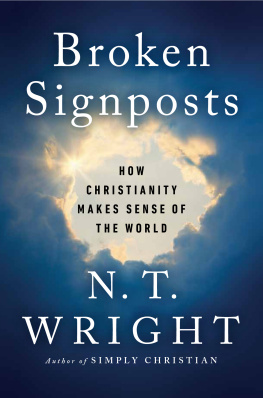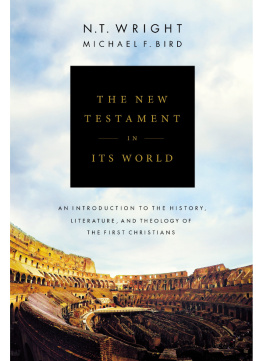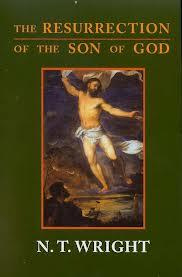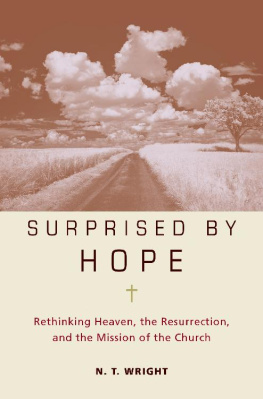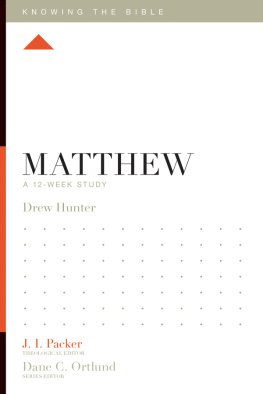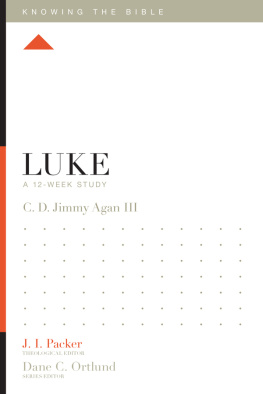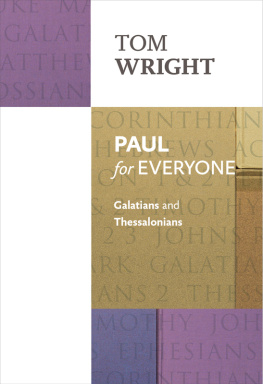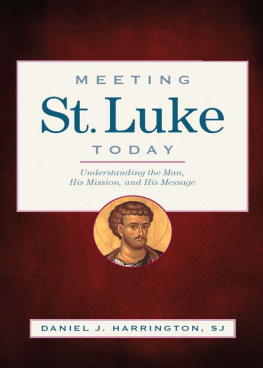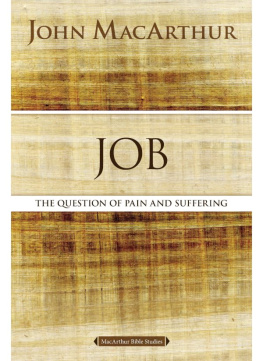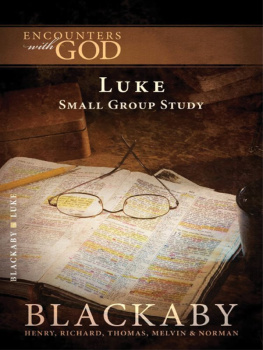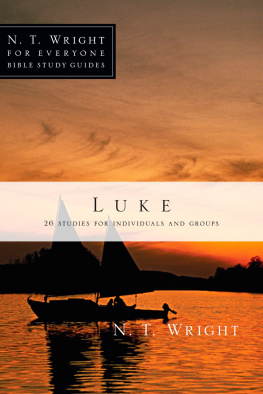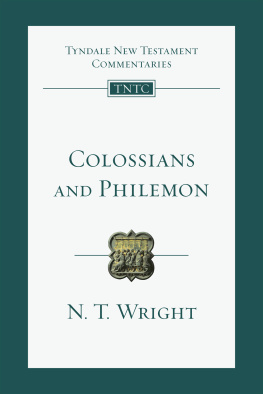LUKE
for
EVERYONE
N. T.
WRIGHT

Copyright 2001, 2004 Nicholas Thomas Wright
First published in Great Britain in 2001 by the Society for Promoting Christian Knowledge
36 Causton Street
London SW1P 4ST
This edition copublished in 2004 by the Society for Promoting Christian Knowledge, London, and Westminster John Knox Press,
100 Witherspoon Street, Louisville, KY 40202.
All rights reserved. No part of this book may be reproduced or transmitted in any form or by any means, electronic or mechanical, including photocopying, recording, or by any information storage and retrieval system, without permission in writing from the Society for Promoting Christian Knowledge, 36 Causton Street, London SW1P 4ST.
09 10 11 12 13 14 14 13 12 11 10
British Library Cataloguing-in-Publication Data A catalogue record for this book is available from the British Library.
ISBN: 978-0-281-05300-1 (U.K. edition)
United States Library of Congress Cataloging-in-Publication Data is on file at the Library of Congress, Washington, D.C.
ISBN: 978-0-664-22784-5 (U.S. edition)
Typeset by Pioneer Associates, Perthshire Printed in Great Britain at Ashford Colour Press
For
Margaret Eleanor Forman
(herself a historian)
with gratitude for the love, support and prayers of over fifty years
On the very first occasion when someone stood up in public to tell people about Jesus, he made it very clear: this message is for everyone.
It was a great day sometimes called the birthday of the church. The great wind of Gods spirit had swept through Jesus followers and filled them with a new joy and a sense of Gods presence and power. Their leader, Peter, who only a few weeks before had been crying like a baby because hed lied and cursed and denied even knowing Jesus, found himself on his feet explaining to a huge crowd that something had happened which had changed the world for ever. What God had done for him, Peter, he was beginning to do for the whole world: new life, forgiveness, new hope and power were opening up like spring flowers after a long winter. A new age had begun in which the living God was going to do new things in the world beginning then and there with the individuals who were listening to him. This promise is for you, he said, and for your children, and for everyone who is far away (Acts 2.39). It wasnt just for the person standing next to you. It was for everyone.
Within a remarkably short time this came true to such an extent that the young movement spread throughout much of the known world. And one way in which the everyone promise worked out was through the writings of the early Christian leaders. These short works mostly letters and stories about Jesus were widely circulated and eagerly read. They were never intended for either a religious or intellectual elite. From the very beginning they were meant for everyone.
That is as true today as it was then. Of course, it matters that some people give time and care to the historical evidence, the meaning of the original words (the early Christians wrote in Greek), and the exact and particular force of what different writers were saying about God, Jesus, the world and themselves. This series is based quite closely on that sort of work. But the point of it all is that the message can get out to everyone, especially to people who wouldnt normally read a book with footnotes and Greek words in it. Thats the sort of person for whom these books are written. And thats why theres a glossary, in the back, of the key words that you cant really get along without, with a simple description of what they mean. Whenever you see a word in bold type in the text, you can go to the back and remind yourself whats going on.
There are of course many translations of the New Testament available today. The one I offer here is designed for the same kind of reader: one who mightnt necessarily understand the more formal, sometimes even ponderous, tones of some of the standard ones. I have of course tried to keep as close to the original as I can. But my main aim has been to be sure that the words can speak not just to some people, but to everyone.
This particular volume opens up one of the most brilliant writings in early Christianity. Luke tells us that he had had a chance to stand back from the extraordinary events that had been going on, to talk to the people involved, to read some earlier writings, and to make his own quite full version so that readers could know the truth about the things to do with Jesus. He was an educated and cultured man, the first real historian to write about Jesus. His book places Jesus not only at the heart of the Jewish world of the first century, but at the heart of the Roman world into which the Christian gospel exploded and which it was destined to change so radically. So here it is: Luke for everyone!
Tom Wright
ADAnno Domini, i.e., the dating system beginning with the (supposed) birth of Jesus in AD 1, though the true date was probably 4 BC or even earlier. It is sometimes replaced by CE (common era).
BCBefore Christ, i.e., the dating system, counting backwards, which ends with the (supposed) birth of Jesus in AD 1. Sometimes replaced by BCE (before the common era).
NTNew Testament
OTOld Testament
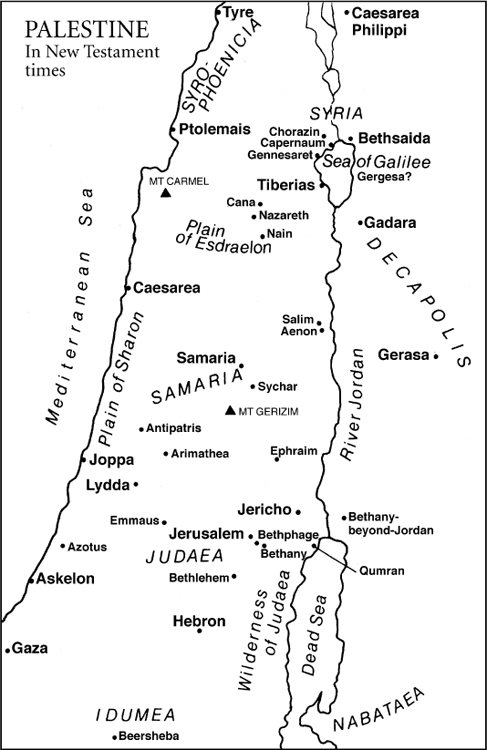
1Many people have undertaken to draw up an orderly account of the events that have occurred in our midst. 2It has been handed down to us by the original eyewitnesses and stewards of the word. 3So, most excellent Theophilus, since I had traced the course of all of it scrupulously from the start, I thought it a good idea to write an orderly account for you, 4so that you may have secure knowledge about the matters in which you have been instructed.
SPACE ALIENS TOOK MY BABY, screams the headline. Or perhaps GRANDMOTHER SWIMS ATLANTIC. And what do people say? It must be true; it was in the newspapers. I saw it on television. The person who told me was told by someone who was there at the time.
We have learnt to laugh at all of these. News is packaged to tell us what we want to hear. Television cameras often deceive. And stories which come from a friend of a friend might as well be fiction. How do we know what to believe?
Luke opens his gospel with a long, formal sentence, like a huge stone entrance welcoming you impressively to a large building. Here, he is saying, is something solid, something you can trust. Writers in the first-century Mediterranean world quite often wrote opening sentences like this; readers would know they were beginning a serious, well-researched piece of work. This wasnt a fly-by-night or casual account. It would hold its head up in the world at large.
Of course, we think, with our suspicious modern minds, he would say that, wouldnt he? But look at the claims he makes. Luke isnt asking us simply to take it on trust; he is appealing to a wide base of evidence. Several others have written about these events; he has these writings, some of which we may be able to trace, as sources. He has been in touch with eyewitnesses who have told him what they saw and heard. And, perhaps most important, he has listened to accredited teachers within local communities. We need to say a further word about these people.
Imagine a village in ancient Palestine. They didnt have printed books or newspapers, television or radio. They had official storytellers. Some great event would happen: an earthquake, a battle, or the visit of an emperor. Within a day or two the story would be told all round the village, and would settle into a regular form. Everyone would know the story, but some of the better storytellers in the village would be recognized by the others as the right people to tell it.



